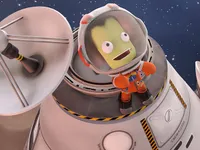Kerbal Space Program 2 to launch on early access in February 2023
It's available at an introductory price of $49.99.
Breaking space news, the latest updates on rocket launches, skywatching events and more!
You are now subscribed
Your newsletter sign-up was successful
Want to add more newsletters?

Delivered daily
Daily Newsletter
Breaking space news, the latest updates on rocket launches, skywatching events and more!

Once a month
Watch This Space
Sign up to our monthly entertainment newsletter to keep up with all our coverage of the latest sci-fi and space movies, tv shows, games and books.

Once a week
Night Sky This Week
Discover this week's must-see night sky events, moon phases, and stunning astrophotos. Sign up for our skywatching newsletter and explore the universe with us!

Twice a month
Strange New Words
Space.com's Sci-Fi Reader's Club. Read a sci-fi short story every month and join a virtual community of fellow science fiction fans!
Get your Kerbonauts ready for a new generation of gaming.
Kerbal Space Program 2, the long-awaited (and delayed) space exploration game sequel that simulates exploration of planets and stars like the sun, now has an early access release date of Feb. 24, 2023. It will be available at an introductory price of $49.99.
Kerbal Space Program released on June 24, 2011 and is well-known today for teaching users the physics of spaceflight. The successor game, which still puts the loveable Kerbonaut characters through extreme orbital mechanics, will initially be available on PC only through Steam, in the Epic Games store, and other digital storefronts, Private Division and Intercept Games announced Friday (Oct. 21) in a statement. Other platforms will be added as the game matures.
"Players will get a front-row seat to development during Early Access and become a part of an active development process, contributing with feedback to make the best KSP sequel yet," the companies said in the statement.
Kerbal Space Program | $39.99 from Green Man Gaming
While we keep waiting for KSP 2, you can get on board with the original. Recreate real space missions or just watch your creations explode in the pursuit of the Mun and beyond in this space exploration game.
KSP 2 was supposed to be ready in 2020, but was delayed several times to create a "stable, polished whole" for game features, Intercept's creative director, Nate Simpson, told fans on a Kerbal forum in 2021.
The Kerbals of KSP 2 will have more hairdos, very distinguishable personalities and a range of exaggerated facial expressions to show off their reactions to physical forces in space.
Read more: Kerbal Space Program 2 will launch Kerbonauts with wild new hairdos and emotions
Breaking space news, the latest updates on rocket launches, skywatching events and more!
The original game has attracted attention from big names in the space community keen to leverage the platform for educational purposes.
For example, in 2020 NASA used Kerbal to educate a new audience about SpaceX Crew Dragon flights, while the European Space Agency gave guidance to recreate their own space missions. Kerbal is also popular among high school teachers and university professors for physics practice.
The developers say other features coming to the game include:
- Customizable parts and new space-flight technology: Players will have over 350 new and improved parts including engines, fuel tanks, procedural parts systems, and much more. The overhauled vehicle assembly interface includes part sorting and a blueprint view for making precise adjustments, along with new part coloring.
- Improved onboarding: New animated tutorials, improved user interface, and fully revamped assembly and flight interfaces allow both experienced and novice players to quickly put their creativity to the test without sacrificing any of the challenge from the original game.
- New exploration tools: You can now use time warp while accelerating and plan complex maneuvers with ease using the new non-impulsive maneuver planner. New spheres of influence, map iconography, and atmosphere indicators take the guesswork out of interplanetary maneuvering.
- New environments to explore: Clouds, atmospheric scattering, and an all-new terrain system.
Follow Elizabeth Howell on Twitter @howellspace. Follow us on Twitter @Spacedotcom or Facebook.

Elizabeth Howell (she/her), Ph.D., was a staff writer in the spaceflight channel between 2022 and 2024 specializing in Canadian space news. She was contributing writer for Space.com for 10 years from 2012 to 2024. Elizabeth's reporting includes multiple exclusives with the White House, leading world coverage about a lost-and-found space tomato on the International Space Station, witnessing five human spaceflight launches on two continents, flying parabolic, working inside a spacesuit, and participating in a simulated Mars mission. Her latest book, "Why Am I Taller?" (ECW Press, 2022) is co-written with astronaut Dave Williams.


